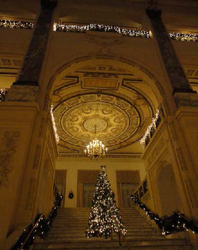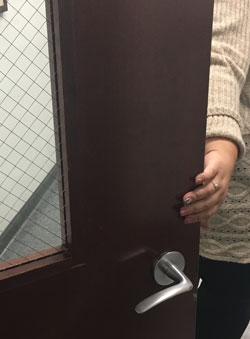Let’s face it, the holiday season is upon us. There is no more putting it off. Everywhere we turn from Wilson Hall to the dorm’s decorations, the holidays are thrusted into our faces. Perhaps the most obvious sign of the holidays is the television specials we all know and love.
There are the “25 days of Christmas” on ABC Family, “A Christmas Story” on every channel at least once, and the “Rockefeller Center Christmas Tree Lighting.” Now hang on a minute, what do all these television specials have in common? They are all solely about the Christmas holiday. Not once do you find a Hanukkah television show (besides the one-time “Rugrats” Hanukkah special that aired 15 years ago) or a Kwanza special aired on national television. In our lifetimes, national television has only aired one children’s holiday special that had nothing to do with the most commonly celebrated holiday during this season, Christmas.
Why does the world neglect the fact that Christmas is not the only holiday occurring this time of year? Does the United States not pride itself in its cultural diversity? The lack of media and representation of the other holidays featured during the Christmas season has posed a problem for years. However, the United States government is trying to take small steps towards diversifying the holiday season.
Since the 1980’s, the United States government has continuously tried to limit the media from using references solely towards Christmas during the holiday season. To support the separation of church and state, public mentions of Christmas trees are now called “holiday trees” instead. The government also attempted to censor the New York City public school system by replacing the word “Christmas” in classic festive songs and banning nativity scenes from lobbies. These were only a few of the proactive steps that the government has taken to encourage diversity, but people still continue to promote there own holidays above all others.
I am sure walking around this holiday season you have noticed the trend of Christmas decoration everywhere you go. Even on our beloved campus, we are overpowered by Christmas. Wilson Hall is clearly decorated in strict regards solely towards this holiday. Whether they are called holiday trees or not, the abundance of trees in the most historic building on campus, Wilson Hall, is a symbol of Christmas whether we like it or not. Though the University clearly represents Christmas, Hanukkah and Kwanzaa decorations are harder to find than a needle in a haystack. Emily Halpern, junior and member of Alpha Xi Delta sorority states, “Being Jewish, I do appreciate the Menorah the University has in the Student Center and also the Hanukkah decorations in the windows in McAllan Hall, but I feel that in this day and age, our world is entirely Christmas oriented. Unfortunately, us in the minority just have to accept that fact.” Halpern is right in her theory about this day and age, but will there ever be a way to diversify the holidays?
This change in the holidays may never come to the United States due to the staple television specials that air each year and the music that will forever be associated with Christmas. Though a complete change will not happen, us at the University can influence others to make an effort to make small changes to represent other holidays. An individual can simply change their “Merry Christmas” to “Happy Holidays” to help support holiday diversity. This small change will not only show maturity as an individual but it can also show that you have compassion and consideration for the melting-pot we call home. We can be the change.
PHOTO COURTESY of Alissa Catalano



